August 2023 Feature Release Highlights
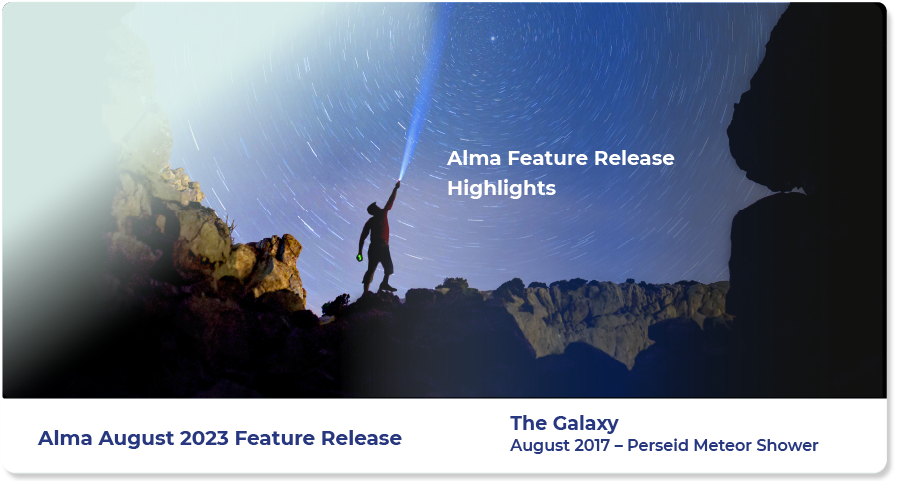

NERS 2022 enhancements
The August Release sees the implementation of two NERS 2022 enhancements:
With the inclusion of these enhancements, we mark the completion of the NERS 2022 enhancement cycle. Looking ahead, we are already planning and preparing for the NERS 2023 cycle, continuing our long standing collaboration with our user community.
New Cookies Banner
As part of our commitment to transparency and privacy protection, we will be introducing a new feature in Alma and all our higher-education back-office products that requests user consent for the use of cookies. Regardless of your cookie preferences, your daily activities and Alma functionality will remain unaffected. See full details about this in the August Release Notes.

This feature will be rolled out gradually post August Release.

New PO Line task list
The next-generation Alma UI design is now available for the PO Lines task list. Individual users can opt-in to use the new UI task list layout, or continue using the classic UI.
The New Layout is designed to provide users who manage PO lines with a more streamlined experience, in which more information is available at a glance and new search and facet options make it easier to locate PO lines with certain characteristics.

The new user Interface is being gradually rolled out. For more information see here. In August the new UI will be turned off by default. Users are encouraged to opt-in to benefit from the new UI advantages.
There are multiple changes and advantages with the new interface, which also addresses a number of Ideas Exchange items. For more information see here.
A webinar on “The New Unified PO Line list” will be delivered in two separate time zones on Aug. 08.
For further information and registration see the Alma 2023 Roadmap Webinar Series page.
 Users will have a more streamlined experience, more information available upfront, new search and facet options and many more advantages.
Users will have a more streamlined experience, more information available upfront, new search and facet options and many more advantages. 
Linked Data
Linked Open Data Enrichment for EuroVoc Authorities
The Linked Data enrichment process for bibliographic records that are linked to EuroVoc authorities now also generate URIs to the EuroVoc authority records, so that libraries that work with EuroVoc authorities can benefit from their Linked Open Data capabilities.
New Search Indexes for URI Cataloged in $$1
New search indexes are added for Real World Object (URI), so the titles can be searched by cataloged URIs.
This is useful for libraries that catalog URIs, and enables them to use these identifiers in their searches.
ORCID URI Enrichment for Bib Records Using the Alma Refine Cloud App
Configuring an integration profile for ORCID in Alma is now possible, enabling you to use your ORCID credentials to add ORCID URIs to your Bib records using the Alma Refine cloud app.
Bibliographic record retention
It is now possible to prevent a bib record from being deleted. This is based on a new "Bibliographic Collection Retention definition" table, where administrators can specify conditions for record retention.
For network zone records, the retention is determined according to the configuration in the Network Zone table.
When attempting to delete a bibliographic record that is linked to the Community Zone, the removal of the linked record from the local institution is restricted based on the specific configuration set by that institution.
 This is especially useful for libraries with collaborative collections, who wish to protect certain records from being deleted.
This is especially useful for libraries with collaborative collections, who wish to protect certain records from being deleted.
 Idea Exchange - Browse Authority headings
Idea Exchange - Browse Authority headings
A new feature called Browse Authority Headings has been introduced, enabling users to browse authority files for name and subject authority records.
This browsing functionality displays both the preferred and non-preferred terms in the authority record, clearly indicating which terms are preferred.
 This is useful for librarians who wish to browse the authority vocabulary using a specific name or subject, without being sure if it is the preferred term or not.
This is useful for librarians who wish to browse the authority vocabulary using a specific name or subject, without being sure if it is the preferred term or not.
 Idea Exchange - Undo options in the Metadata Editor
Idea Exchange - Undo options in the Metadata Editor
Previously, it was not possible to undo removing fields from a bib record.It is now possible to "Undo Remove, Cut, Paste Field" (Ctrl+Shift+Z), that allows catalogers to undo these actions as well.
 This is useful when a field is accidentally removed and needs to be recovered, without having to restore a previous version of the record.
This is useful when a field is accidentally removed and needs to be recovered, without having to restore a previous version of the record.
 Idea Exchange - Library scope with the Physical Titles search
Idea Exchange - Library scope with the Physical Titles search
Staff that define a preferred libraries scope will only see search results of the physical titles that have holdings in the defined libraries.
The library scope will be remembered and applied across sessions and search types.
 This is helpful for staff that are only interested in titles held by specific libraries. They no longer have to add a library search condition to every physical titles search.
This is helpful for staff that are only interested in titles held by specific libraries. They no longer have to add a library search condition to every physical titles search.
Automated upload of electronic holdings now supported for PROJECT MUSE titles
 Automated upload of electronic holdings for PROJECT MUSE saves staff manual labor, and time and improves accuracy and efficiency.
Automated upload of electronic holdings for PROJECT MUSE saves staff manual labor, and time and improves accuracy and efficiency.
 Long term digital loans with limit to concurrent usage
Long term digital loans with limit to concurrent usage
Long term digital loans is a process by which libraries can lend out digital copies (representations) of physical materials to patrons for periods of a day or more. The system imitates the experience of lending physical items by allowing you to limit the number of digital copies being lent concurrently and configuring the time period of the loan. As with physical items, if the digital copy is on loan, the requester enters a waitlist. Alma keeps track of the patrons who requested the digital representation and notifies the next person in the waitlist when it is available. Users can also indicate the list of physical items that are represented by each digital resource.
Long term digital loans introduces a rich set of policies, is fully integrated into the Alma requests workflow, and is accessible from the patron Library Card in Primo.
 There is full control over digital loans, both from a workflow and from a copyrights perspective.
There is full control over digital loans, both from a workflow and from a copyrights perspective.
 NERS Enhancement - Logical Collections for automatic title assignment
NERS Enhancement - Logical Collections for automatic title assignment
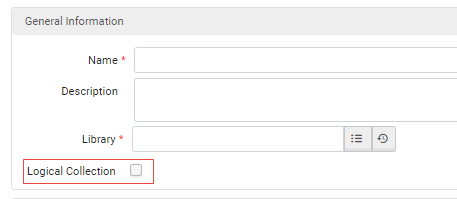
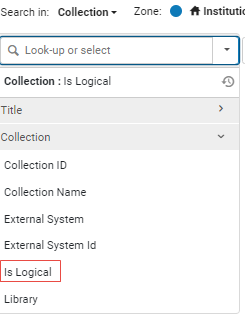
Enhancements have been made to the Alma internal search menu functionality, incorporating "smart" search capabilities. The search feature now provides suggestions for synonyms, interchangeable terms, and support for spelling mistakes. This enhancement facilitates users' navigation making it easier to find links in the Alma search menu.
With the August 2023 release similar terms functionality will be supported only for English. Spelling will be supported in the following languages: English, German, Spanish, Danish, Finnish, French, Hungarian, Italian, Japanese, Dutch, Norwegian, Portuguese, Romanian, Russian, and Thai.
Similar terms will be gradually enriched with additional languages in forthcoming releases.
 This facilitates the user's navigation in the Alma menu making it easier to find links in the Alma search menu.
This facilitates the user's navigation in the Alma menu making it easier to find links in the Alma search menu.  NERS Enhancement - An improved user interface for the letter editor
NERS Enhancement - An improved user interface for the letter editor
The interface of the letter editor has been improved with a side by side real time preview, improved readability for the text editor and error detection, and a "Save Draft" option.
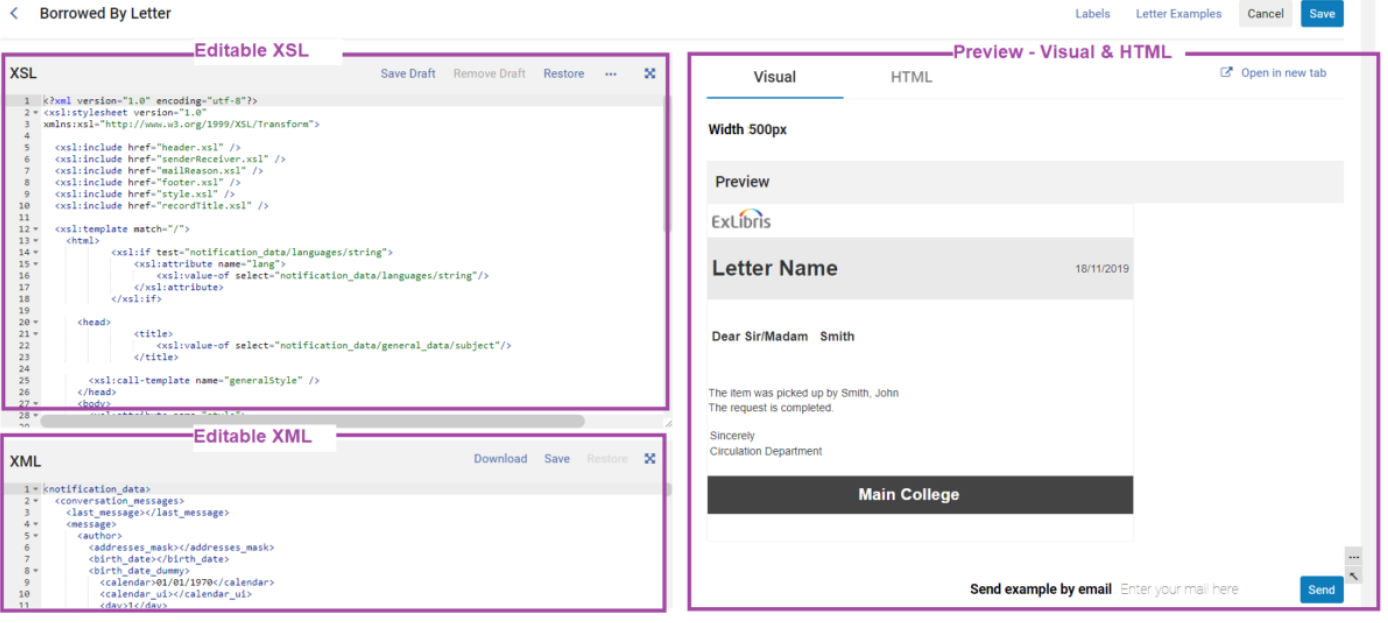
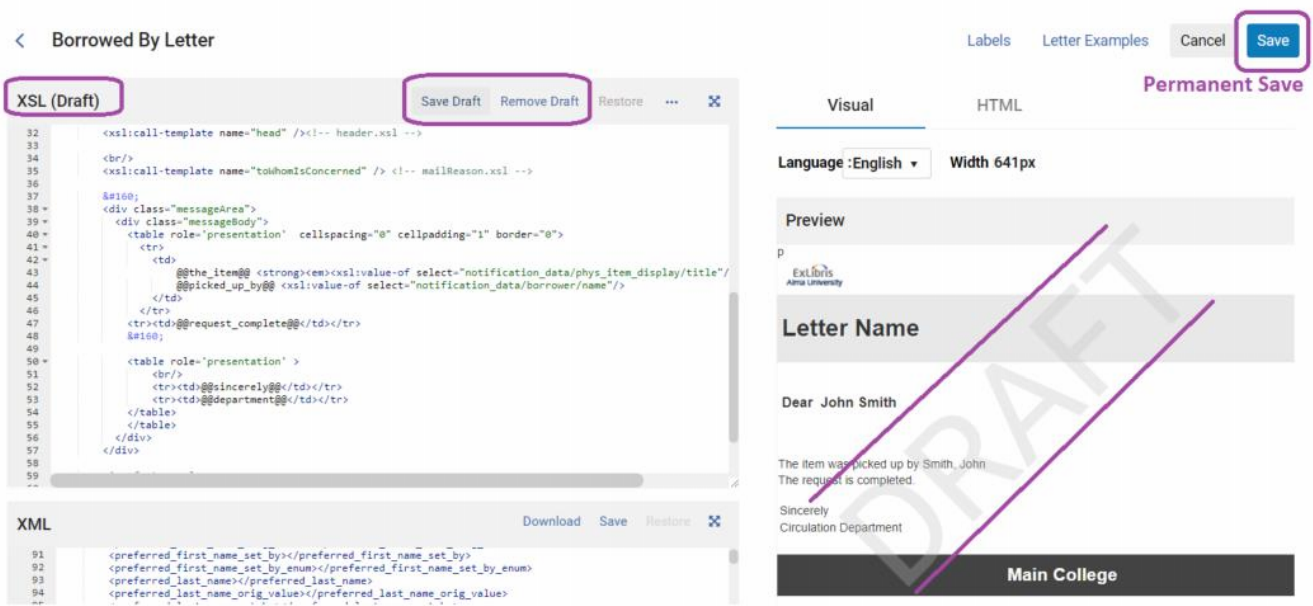
A webinar on “The New User Interface for Customizing Letters in Alma” will be delivered in two separate time zones on Aug. 09.
For further information and registration see the Alma 2023 Roadmap Webinar Series page.
 Creating and editing letters will be easier and more transparent, offering more control to the staff user.
Creating and editing letters will be easier and more transparent, offering more control to the staff user.
A new layout for the “Manage Sets” page
The next-generation Alma UI design is now available for the Manage Sets page. The New Layout is designed to provide users with a more streamlined experience, in which more information is available at a glance and new facet options make it easier to locate sets with certain characteristics.
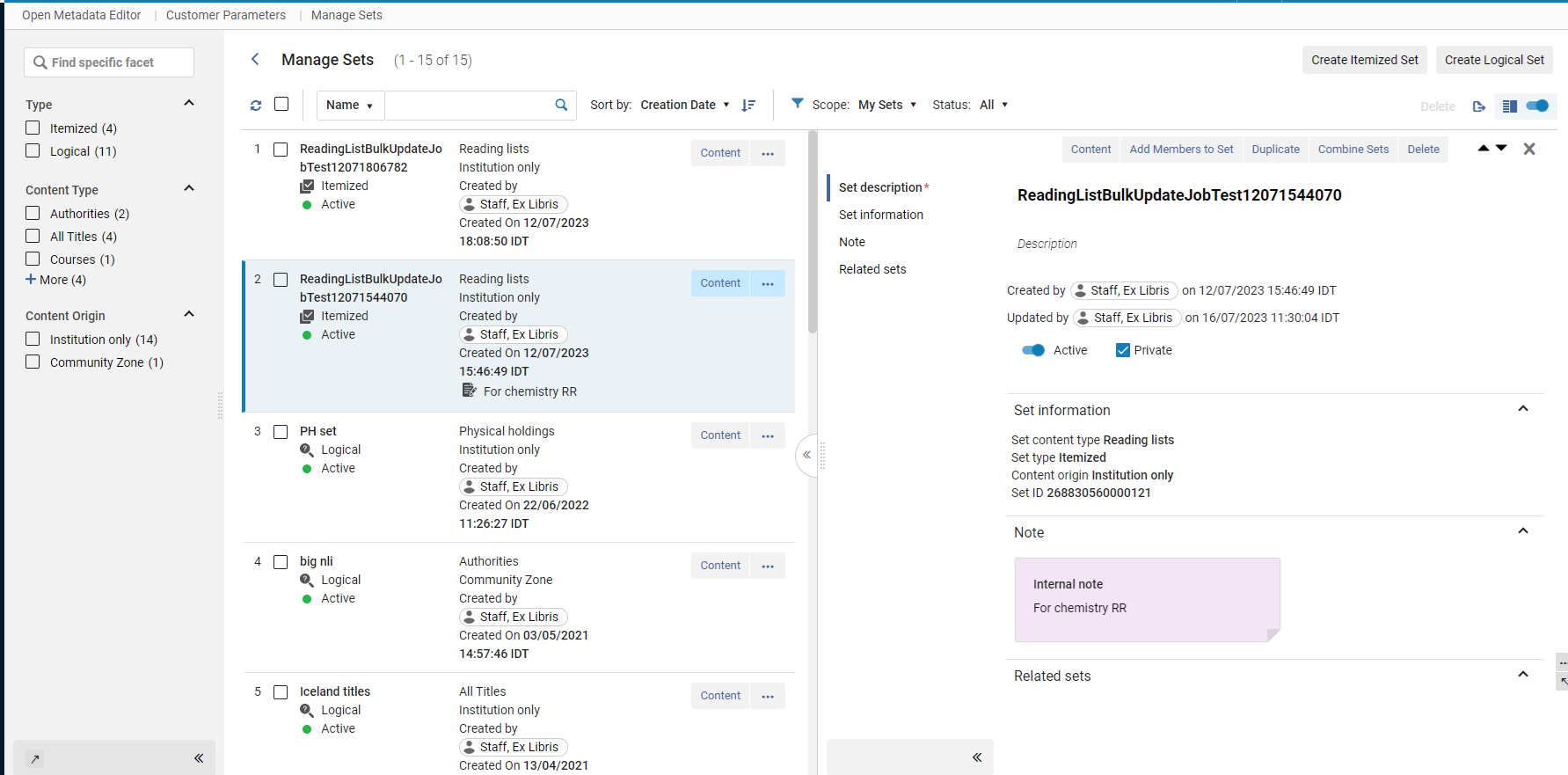
In addition, the physical holdings sets management has been enhanced enabling operators to easily create and manage itemized as well as logical sets of physical holdings records. This is especially useful when you want your set to include specific holdings, or to create an itemized set from a logical set of all holdings that fulfill a condition at a specific point in time.
 This is a better overall user experience when creating and managing sets.
This is a better overall user experience when creating and managing sets.

 Idea Exchange - Local parameter fields labeled in Analytics
Idea Exchange - Local parameter fields labeled in Analytics
Local parameter fields in analytics now include the institution label for the field, in addition to the local parameter number.

 It will be easier for analytics designers to choose the correct field to include in analyses.In addition, users who review reports / dashboards that include local fields, can easily understand the contents of the labeled fields.
It will be easier for analytics designers to choose the correct field to include in analyses.In addition, users who review reports / dashboards that include local fields, can easily understand the contents of the labeled fields.
Analytics new layout: feature rollout moving to phase 2
With the August release the new Analytics layout has been switched on for everyone as the default layout.
You can switch back to the old layout until the November release,
If you haven't yet tried the new layout, don't be a in a hurry to switch back to the old layout. Try getting used to the new layout, so that you will be fully familiar with it by the November release.
For more information about how to use the new layout, watch this webinar and check out our Online Help.

New API for the Retrieval of Import Profile Report: Single Matches and Multi Matches
There is a new API to retrieve an Import profile report for both single and multi matches.
New API for updating Logical Sets
A new API is now available for updating logical sets.
New API for Managing Library Relations
A new Library Relations API is now available. This API can be used to retrieve, create, update, and delete library relations.
Location API Enhancement
The Location API now includes the options to create or delete a library location.
Total views:
1637

